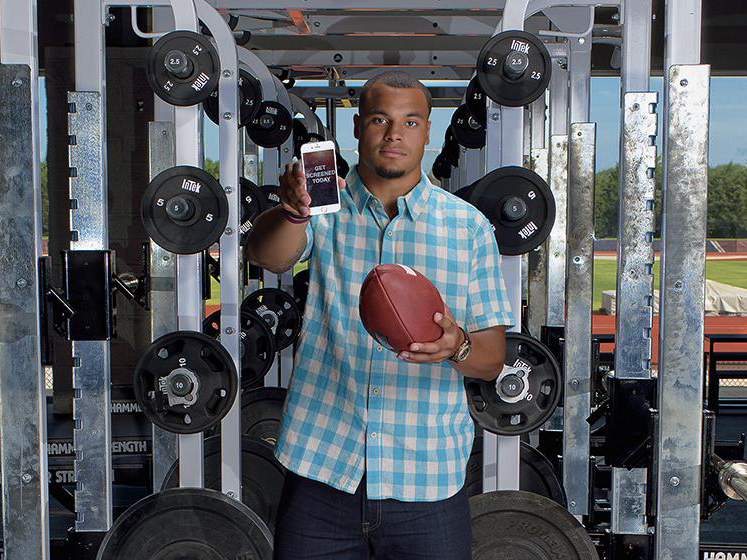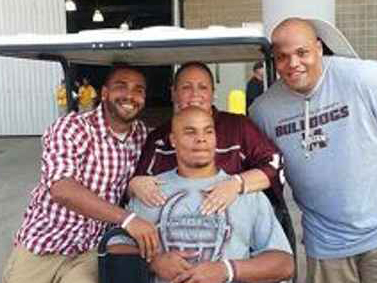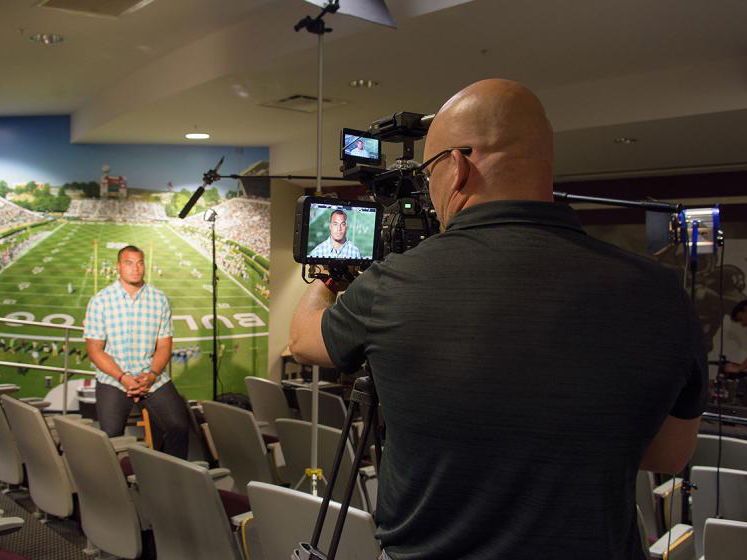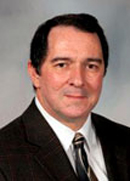Group wants Mississippians to #GetScreened4Dak

Published in News Stories on March 06, 2017
A statewide group working to lower colorectal cancer deaths is getting help from a popular sports figure to increase screening and grassroots help to raise money for its work.
Help comes from Dallas Cowboys quarterback Dak Prescott who is encouraging people to be screened and from a Mississippi vehicle license plate that will pump some money into the effort.
The 70x2020 Colorectal Cancer Awareness Initiative, based at the University of Mississippi Medical Center and formed in April 2014, unites efforts of multiple gastrointestinal physicians, health-related organizations, grassroots groups and individuals working to see 70 percent of eligible Mississippians screened for colorectal cancer by 2020 and ultimately fewer deaths from this disease.
With help from Prescott, whose mother died of colon cancer in 2013 while he played for Mississippi State University, the Initiative's 525 partners hope even more people will get screened.

Prescott, center, pauses for a photo with his mom, Peggy, and brothers, Tad, left and, Jace, right, during her battle with colon cancer.
“A public figure can often ignite a community around a health care issue and colon cancer is a disease that needs this kind of push. It is one of the few cancers where we have a screening test that actually works to reduce cancer deaths,” said Dr. John Ruckdeschel, UMMC Cancer Institute director.
Prescott worked with the MSU Extension Service to record public service announcements encouraging those who are eligible to be screened for colorectal cancer when appropriate.
“To watch a family member go through cancer and the suffering, that's as hard as it gets,” he says in the videos. “Get screened. It's the right thing to do. Stop it before it happens. Catch it early. Do it for yourself and do it for your loved ones around you.”
The spots were distributed to Mississippi media outlets for release March 1, the start of National Colorectal Cancer Awareness Month, with requests they run them for the next three months. (All of the spots can be watched by clicking here.)
“I hope people will be so moved by the Dak Prescott video they will get off their couches and into their gastroenterologist's office,” said Dr. Roy Duhe, professor of pharmacology/toxicology at UMMC, who helped form the 70x2020 Initiative.
Some surveys show screening is increasing slightly, said Duhe. He's most encouraged that the gap between blacks and whites who are screened is getting smaller.
Dr. Sam Pace of Tupelo, a colon cancer survivor who was among the 70x2020 Initiative's first members, was instrumental in securing Prescott's commitment to the project.
This past summer, he watched Prescott record the videos, radio spots and pose for still photographs.
“Dak told me that it's important to him personally,” Pace said. “He said he wants it to be a major part of of his pro career to honor his mother.”

Brian Utley, video producer with the MSU Extension Service Agricultural Communications, records one of the public service announcements featuring Prescott.
“Expectations are that 50,000 people a year will die of this cancer,” Pace said of U.S. cancer figures. “Simply screening at the appropriate time can reduce that to 15,000 a year.”
Pace, a retired gastroenterologist, also was instrumental in securing the specialty vehicle license plates. Proceeds from the “Prevent Colon Cancer… GET SCREENED!” tags go to the 70x2020 Colorectal Cancer Screening Initiative fund. (Donations can be made directly to the fund at the UMMC Office of Development, UMMC Options as category and 70x2020 as fund.)
Tags are being released through county offices now.
Duhe said proceeds will be used to support screening efforts or to help member groups who are providing screenings. “Activities will depend on the total dollars we get,” he said.
The 70x2020 Initiative is attacking the problems from several angles. Members are encouraging those with insurance or the means to be screened to do so. And, members are seeking ways to provide screening for Mississippians who cannot afford it or who lack insurance.

Duhe
Mississippi's colorectal cancer death rate is among the highest in the nation. Too often, people are diagnosed when this cancer is in a later stage and harder to treat, Duhe said.
According to the Mississippi Cancer Registry, 1,579 Mississippians were diagnosed with colorectal cancer and 649 died of it in 2014, the latest year for which verified figures are available. Various studies have estimated screening could avert up to 60 percent of those deaths, or almost 390 for 2014.
National guidelines call for screening to begin at age 50 for most adults. Those who have a family history of colorectal cancer should talk to their doctor about being screened earlier.
Educating and motivating the public to be screened aren't the only hurdles in Mississippi, say 70x2020 Initiative members.
While the ideal screening is a colonoscopy, the state lacks enough doctors and facilities to provide colonoscopies for all residents who are eligible, Duhe said. A fecal immunochemical test, or FIT test, is another good option. Those are best administered through a person's medical home, Duhe said.
A FIT test checks for blood in the stool. If blood is found, the person will need follow up testing. FIT tests should be done annually. In a colonoscopy, a doctor uses an endoscope to look into a person's colon. Special tools can be used to remove pre-cancerous polyps that are found. Colonoscopies are done every 10 years if there is no reason to do them more frequently.
Duhe also warns that Mississippians need a medical home, a doctor with whom they consult regularly, when they consider either test.
“If they don't have a medical home, we want to help them connect with one,” Duhe said.
He especially hopes Prescott's message will hit home with adult men who too often fail to be screened. The message should resonate with women too. Prescott and his brothers lost their mother, Peggy, after her 18-month-long battle with colon cancer. She was 52.

Do you want to help?
- Those 50 or older can see their doctor about being screened.
- Post Dak's videos to your social media.
- Text relatives and friends to encourage screening and help educate others about screening.
- Let others know by using the hashtag #getscreened4dak and #Ihadthetalk


